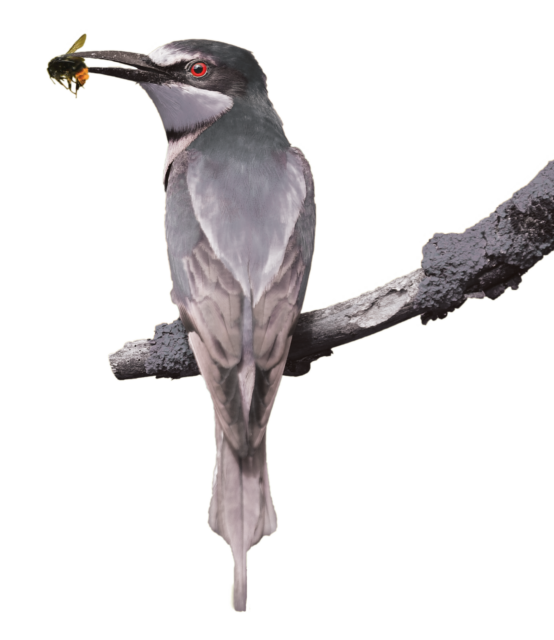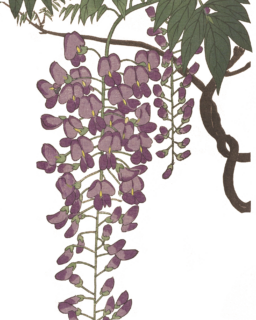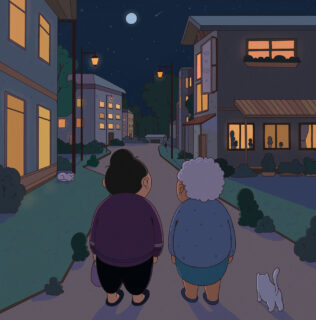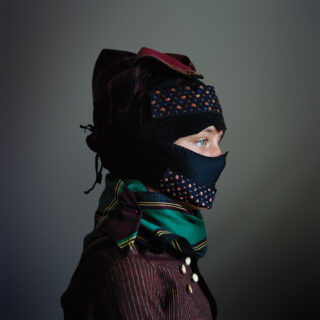
The flowers were still shy and wistful, their buds just breaking into bloom as it was early spring yet. There were bloodred poppies growing alongside the road, and Jude picked some as Villiam’s guards passed, marching in tandem toward the village. Jude pretended they didn’t exist. He didn’t like northerners. He thought they carried an element of evil. Their light hair never seemed dirty, and their skin never showed any signs of wear. He didn’t trust men so clean. They understood only the surfaces of things, which was why they appeared so perfect. They took Jude’s depth and pain as weakness, he thought. They didn’t respect his thoughtfulness. They saw him and his son as farm animals, no better than the lambs he and his son raised. And they seemed not to care about the villagers’ safety. Not once during an attack by bandits had the guards defended the village. They retreated up the mountain to the manor and took aim. That was all. They were cowards, Jude thought. What he didn’t know, of course, was that the bandits worked for Villiam.
He paid them to ransack the village any time there was a rumor of dissent among the farmers. Father Barnabas conveyed such rumors to the lord. That was his primary function as the village priest: to listen to the confessions of the people down below and report any sagging dispositions or laziness to the man above. Terror and grief were good for morale, Villiam believed.
To get to Agata’s grave, Jude and Marek passed into the woods. There were horse chestnuts on the ground. Swine were let to pannage there, and as Marek and Jude walked along they could hear some snorts and squeals. Past those woods was an orchard of apple trees, too old to bear fruit. The silver bark was thick as armor and laced high with the scars from years and years of villagers etching their names with X’s. Past the orchard, the grass was thin, the dirt pale and rocky, but as it had just rained, the ground gave in a pleasant way under Jude’s bare feet and Marek’s thin-soled shoes. Marek picked a handful of chamomile and cornflowers growing near a trail of runoff, then followed an ostrich fern off the path toward a patch of iris. He picked an iris in bloom and some young sprigs of freesia. Then they turned toward a grove of black poplars, where, under the largest tree, was Agata’s grave.
Marek was solemn as they walked, his stomach churning and his mind still darkened by the scene in the village square. Of course he had seen bandits hanged and disemboweled before, but there was something special about this man. He hadn’t looked scared as Villiam’s men dragged him to the gallows. Maybe he knew where he was going. Like Jesus on the Cross.
“That bandit,” Marek said. “Do you think he had a mother?”
“Everybody’s got a mother,” Jude replied.
“Is that bandit’s mother sorry he’s dead?”
“They aren’t like us. They have no hearts.”
“Do you think he had a son of his own?”
“A bastard, surely, if he did. Who cares?”
“Did my mother love me?”
“She died for you,” Jude said. “That should be enough.”
“Will I see her in heaven?”
“Of course you will. As long as you get there.”
“What about you?”
“Don’t worry about me, Marek,” Jude said.
But Marek did worry that his father wouldn’t get into heaven. The man had an unkind hand. And when he prayed, Marek had the sense that there was anger steaming off his father’s shoulders, the cruelty inside him escaping like a vapor. Not that the man was impious. But Jude’s piety was a kind of violent urge and not the love and peace it ought to be, Marek thought. Jude whipped himself every Friday and had taught Marek to do the same. But Marek thought Jude whipped himself a bit too passionately. He’d get sweaty, grunting, moving the whip across one shoulder, then the other, wincing and breathing so hard that spit drooled from his mouth, and then he sucked it in and spat it out violently, as though it pleased him, as though the pain felt good. This frightened Marek because he, too, enjoyed the pain, and he was ashamed of that. Since he was little, a scraped knee or a whipped back, anything to make his body hurt, felt like the hand of God upon him. He knew that wasn’t right. So he kept it private, which made his father’s shameless display of pain and pleasure seem all the more perverse. All Marek really wanted at this age was to go to heaven, where God and his mother would love him.
“But what if something goes wrong?” he asked Jude. “What if you don’t make it to heaven?”
“If God wills it, I will.”
Agata’s grave was marked with a plain, rounded rock from the stream. Jude had hammered a violent chip into the rock as though he really was broken by the girl’s death. Jude was illiterate, like everyone else in Lapvona, but he said that the chip in the rock had a meaningful shape.
It was Marek’s custom to lie down on his mother’s grave, placing his body crosswise as though he were a babe in her dead arms through the dirt. He had always felt that the ground below him was charged with a sense of belonging. He would lie there and gaze up at the swaying branches of the poplar tree and listen for a birdsong. A bee-eater or an oriole might tweet a few happy notes. Marek would take this as his mother singing down to him from heaven.
Now, standing by the grave, he heard a magpie song. It was angry and harsh, raspy chatter like an old lady scolding him from her window.
“Why don’t you lie down today?” Jude asked, placing the flowers by the chipped stone.
“Not today. The birds are singing too sad a song.”
Jude didn’t believe in birdsong. He didn’t trust birds. They weren’t of the land, and he was a man of the land. He loved his lambs because they were like him. They were drawn to the comfort of the pasture, following the edge of the sun-drawn shadows to stay cool and warm according to the breeze. Jude was like that. He was a slave to the day as it rose and fell, and he felt this was his righteous duty—lamb herding was his God-given occupation. He ignored the church bells. He didn’t need to track his time. Nature did it for him. He was born in that pasture and felt he would die in it, too. Why had he not buried Agata in the pasture? Marek had asked a few times. Jude would never entertain such a question.
“Let’s go then,” Jude said, already turning back toward the woods.
The path they’d worn from Agata’s grave through the woods to the pasture was narrow because Jude and Marek never walked side by side. Jude always walked in front. Marek knew his father’s body from behind as well as he knew his hands or his face. Jude’s feet landed straight on the ground. Marek’s step was outward-turning, like a duck’s, and if he didn’t concentrate, the line he’d walk would veer to the right, such was the turning of his body against nature. Jude’s ankles were fine, the joint bolted and smooth, and the thin of his leg below the calf as narrow as a wrist. Marek’s ankles were swollen and freckled, often scraped by briars and bleeding and itchy. His skin was thin and delicate. Ina rubbed salve on his feet from time to time to keep the skin from peeling or rotting and falling off, she said. “You’re like a snake,” she told him. Jude’s calves were round and taut and tan, and the backs of his knees had lines from the tendons as fine as gut strings. His pants covered the rest of his legs, and were patched at the seat and between the thighs. His buttocks were high and strong. Marek knew his father’s body was beautiful. But he didn’t revere it. He simply respected Jude’s physique as a part of nature, the way he found a vulture beautiful, or a cow. He knew that he didn’t resemble his father. You couldn’t compare a plover to a chicken. They were different kinds of animals. No one who saw the two together would ever guess they were of blood relation.
Jude’s hips were narrow, his back was long, his shoulders strong and hunched despite their broadness, penitent. He walked with his head bowed. He took this posture having spent so many years looking down at his lambs. Sometimes Marek regarded him with admiration, a man of the harsh world who had given him a roof over his head, had mannered him in his ways, father to son. And other times Marek regarded him as a man living in the shadow of sin. He pretended to sleep while Jude molested himself every new moon under the sour woolen blanket by the fire in winter, or under the open window in spring. Summers and warm autumn nights they slept in the pasture under the stars with the lambs to make sure the wolves would stay away, Jude said. But Marek knew it was because Jude liked to feel the warm air on his skin as he slept, as though God were touching him in the breeze. Each night that Jude molested himself, he produced a baritone groan of such horror, such pain, only the Devil could be behind it, Marek thought. After the groan, Jude’s body stiffened, then rocked, and it seemed to Marek that he was undergoing a spiritual ablution, as though to eject some evil from his body. Marek never let on that he knew this about his father, but he did know it. And it was yet another impediment, he believed, to the man’s passage to heaven.
The sky seemed to darken now as they entered the woods. The air was chilled between the trees, no warm wind blew, but the ripeness of the earth smelled sweet and musty still. Jude preferred spring to winter. He loved the color and romance of spring. He loved the sun. Sitting and watching his lambs in an afternoon, not a shadow in sight, Jude could feel God’s lips on his cheek every time he turned to face the light. That was God for him—the kiss of sun. God’s hand on his bare skin was the one certainty that rose up through the abstractness of truth and thought, everything, and gave Jude a sense of belonging on Earth. He loved the grass between his toes and the soft touch of a lamb against his leg as it passed. He loved the young eyes of his babes smiling at him, their first spring, such wonder and light. He loved the ply of their joints as they moved and sniffed and chewed the sweet grass, the perk of their ears at the first songs of the titmice and chickadees on their way north. Jude’s flock were polled and pure white. They were the gentlest lambs, and they stayed babes for a season longer than sheep of other origins. Even their milk teeth were rounder and flatter than others. But they were hair sheep. Not fur. They were only good for meat. So of his lambs each year, Jude kept only a few for breeding and the rest were sold for slaughter. This was the sacrifice he made, as his father had done, and his father before him. After the sale of his flock each spring, Jude tried and failed to hold his tears until he was safe and alone in his pasture with the remaining lambs—most of them would go to market next year, of course.
The lambs kept for husbandry were in mourning, too. Jude couldn’t look them in the eyes. He felt guilty for having sent their brothers and sisters to be murdered. Instead of begging them for forgiveness, he treated the remaining creatures cruelly, pretending to forget them when they came in from pasture, then yelling for them to hurry up, as though they were unwanted, left over from a time he wanted to forget. But he depended on those young sheep to keep the flock of new babes on the home range. He didn’t have fences out there in the pasture. He had no dog either. He understood the rhythms of grazing and thirst, and how the lambs preferred to sleep in the shade of the cottage during the day, but under the open sky at night. The babes Jude had now were only six weeks old. He’d watched the ewes’ bellies grow since the fall. As the field went dormant in winter, he had fed them hay by hand, almost apologetically. “I’m sorry this isn’t fresh grass and forbs.” He helped to birth the babes in the lean-to, forbidding Marek to speak. “They don’t like the sound of your voice,” he said, and it was true. The ewes would bleat and snort and grunt if Marek came around. Jude understood that the sheep knew that Marek was a baby in his own way, that he would steal their milk for himself if he could, that he would suck the motherhood from them because he was so starving for it. “Stay away,” they told him. “Baaaa.”
Marek did nurse the ewes when Jude wasn’t looking. He pushed the babes away and put his mouth to the sheep’s teat and sucked until he felt sick. He felt this was his right as a child of God. He was a lamb himself. Not that his meekness stemmed from weakness. Rather, he was a bridled boy, gentled to be a servant to God. And as God’s meek servant, this sheep’s milk was his inheritance. Anything could be cajoled into sense if he thought enough about it. As father and son now walked through the woods toward the pasture, Jude was troubled by the number of shoe prints he saw dotting the path. He hoped they were not the tax collector’s. He had paid all he could that spring already. Any more and he and his boy would starve.
Contrary to his father, Marek preferred winter to spring. He enjoyed the cold. He understood that God’s love burned through the fire in the hearth. He liked the large kindness of that, and so he loved the smell of smoke. He liked the wet of mucus on his lip, how it would crust and pull at his skin and sting when he widened his mouth into a smile. He liked the snow on the boughs and the look of clouds, like a curtain that could be peeled back. A clear blue sky was hard to take. Marek saw it as emptiness, a place with no heaven in it. He preferred the clouds because he could imagine paradise behind them.
He could stare up and focus his eyes on shapes in the clouds, wonder if that was God’s face or God’s hand making an impression, or if God was spying down at him through the gauzy mist. Maybe, maybe. The heavy cloak he wore in winter weighted him with comfort. If Jude loved the stinging whip, Marek loved the cold for its cruelty. He would suffer, endure it, and thereby increase his score of good deeds and humility. Without that cruel wind, there was no need for protection to be met with a fire in the hearth, there was no prayer to be answered. The oil lamp burned with precision. Its flame was female, thoughtful, like a spirit exacting its will against time. The fire in the hearth was masculine, powerful, instinctual, tireless. Marek never shivered from cold. He felt more at ease in the cold, in fact, as though his eyes could see more sharply, he could hear more clearly, everything pure and clean in the snow and crystal air.
Jude thought the spiky shadows of the trees on the snow were menacing, that the cold welcomed evil, a ghost released in every exhalation. Because things died in winter. There were no flowers, no fruit. There were no leaves on the trees. In summer, Jude was more relaxed. He went bare-chested through the field, his skin got brown and hard, his hair got light. In winter, he was stiff in his coat over layers of wool, never changed his long underwear, afraid to be naked against the chill. Marek had been born in February. Of course, he and his father never marked the occasion as the day of his birth, but the day of Agata’s death. Her absence hung over both of them like a hovering bird. Marek felt the bird wasn’t close enough, that it was just out of reach, that if it descended a bit farther he could grab hold of its foot and it would take him away, fly him to some better place. And Jude felt the bird was too close. If he looked up at it, it would scratch his eyes out. The difference was that Jude had known Agata. And he knew the truth about her absence. All Marek knew was that she had given her life for his own, like any good mother would do.


